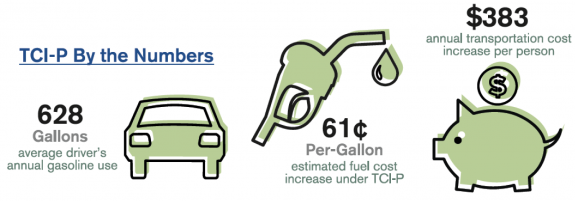There are better climate solutions than an arbitrary cap-and-spend program
Mandate emission reductions by any means necessary, arbitrarily reinvest the money, and make consumers foot the bill. That is the plan under a multi-state initiative to reduce emissions from liquid transportation fuels in the Northeast and Mid-Atlantic regions. It is the wrong plan at the wrong time and ignores more effective market-based alternatives for the sake of shoring up the coffers of state governments. It also completely ignores the reality that our industry has the solution that is available now and can achieve emission reductions quicker and more affordably.
Connecticut, Massachusetts, Rhode Island, and the District of Columbia were the first to sign on to the Transportation Climate Initiative Program (TCI-P). Beginning in 2023, the program imposes a “cap and spend” scheme to reduce greenhouse gas emissions in the transportation sector. These emissions are capped and lowered over time, and major gasoline and diesel fuel suppliers will be forced to purchase allowances to offset emissions that exceed these caps. Participating states are expected to reinvest allowance revenue into policies that, presumably, would further reduce emissions.
By design, the cost of gasoline and diesel fuels will increase substantially. A recent analysis by Tufts University concludes motor fuel prices will increase by 61 cents per gallon. Some are calling TCI-P a “back door carbon tax.” Its supporters know consumers would widely reject such a significant tax increase, especially as Americans struggle with the ongoing coronavirus pandemic and resulting economic crisis.
Imagine the impact this would have on a single mother — say, a grocery store clerk or other essential worker — who is barely making ends meet. She depends on her personal vehicle to keep a roof over her family’s head. TCI-P will make it more expensive for her to get to work and take her children to school, all in hopes she will buy an electric vehicle she probably does not want and almost definitely cannot afford even with a government subsidy.
The average driver uses about 628 gallons of gasoline per year (142.71 billion gallons were consumed in 2019 and there were 227.5 million licensed drivers in 2018). Therefore, a 61-cent-per-gallon increase will raise annual transportation costs by about $383 per person and, presumably, by more than twice that for a working family. It is also safe to assume the cost of groceries, medicine, heating fuels, and other essential goods delivered by truck will increase.

These higher costs are being proposed at a time in which nearly 11 million Americans remain out of work due to the pandemic and our nation faces unprecedented economic uncertainty. Small businesses, including thousands of home comfort providers across TCI-P states, will also be disproportionately affected by higher fuel costs at a very difficult time.
According to data from popular review platform Yelp, as of August 31, 2020, 161,735 American businesses listed on the site had closed since the beginning of the pandemic. Nearly 98,000 of those closures (or about 60 percent) were permanent. According to the U.S. Census Bureau’s Small Business Pulse Survey, nearly 60 percent of retailers across all industries say the pandemic has had a negative effect on their business. There is lack of consensus among economists as to how long it will take the job market, small businesses, and the broader economy to recover once the pandemic ends.
Home heating fuels are excluded from the program, at least for now. But that does not mean they will not be affected. As mentioned, fuel dealers will be subjected to higher diesel fuel costs, a major operational expense. Participating states are expected to invest revenue from the TCI-P into electrification, which may include government subsidies to convert homes and other buildings from liquid heating fuels to expensive and inefficient heat pumps.
There is a right way to do things and a wrong way. An obvious right way would be to ramp up access to renewable liquid fuels that are affordable and available today and are a central component of our industry’s Providence Resolution goals to reduce emissions 40 percent by 2030 and achieve net-zero carbon by 2050. The wrong way would be to arbitrarily raise energy costs for the people whose health, safety and warmth depends on these fuels. Unfortunately, it is becoming clearer by the day that this is exactly what the TCI-P would do. It would increase economic pressures on working-class families and small businesses at a time of unprecedented need.
“So, what’s the alternative?” one might ask. Other states in the U.S. have already shown that significant emission reductions can be achieved through market-based policies that are fuel-neutral and performance-driven. Such policies allow various fuels and technologies to compete based on carbon intensity and reward those market solutions that realize the greatest environmental benefits.
California’s Low Carbon Fuel Standard (LCFS) offers just one example. Policymakers designed the program in hopes that liquid fuels would be phased out in favor of electric vehicles (EVs) but to everyone’s surprise, the opposite happened. Advanced biofuels have vastly outperformed EVs. Since the program’s launch in 2011, biodiesel and renewable diesel have reduced California’s carbon emissions by 56.6 billion pounds — far more than any other fuel or technology.
NEFI believes that Bioheat® Fuel and other renewable liquid heating fuels will enjoy similar success if given the opportunity to compete in a market-based environment that rewards solutions with a low carbon score. Our solution is immediate and affordable. We can deliver dramatic reductions in heating sector emissions with little-to-no cost to the consumer and without straining our regional power grid. The renewable fuels industry also supports rural American jobs and unlike TCI-P, supports small businesses rather than forcing more of them to close their doors.
The TCI-P is the wrong policy at the wrong time. It is an unethical approach to reducing emissions that ignores less costly and more effective solutions to reducing emissions. That is probably why Delaware, Maine, Maryland, New Hampshire, New Jersey, New York, Pennsylvania, Vermont, and Virginia (all states that voted for Biden, by the way) have, for now, refused to enter their constituents into the TCI-P. I say good job. I say TCI-P is not the solution Main Street Americans need, not now, not ever.
Sean Cota is President and Chief Executive Officer of the National Energy and Fuels Institute (NEFI). He can be reached
at sean.cota@nefi.com or 617-924-1000.


